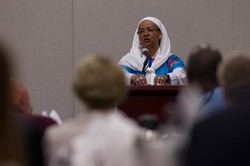Violence against women and children takes many forms – human trafficking, domestic violence and rape, for example. But one commonality is the need for religious communities to address the problem.
Those at Wednesday’s Ecumenical and Interfaith Breakfast at the 221st General Assembly (2014) of the Presbyterian Church (U.S.A.) heard from Presbyterian, Muslim and Sikh speakers on ways people of faith can stand against violence toward women and children.
In the Bible, women are often seen as property and are sold into slavery or murdered, said Shannon Beck, the Presbyterian Mission Agency’s catalyst for reconciliation.
“Our ways that inform how we see our world are rooted in our scriptures and also our cultural traditions,” she said.
But we must follow Jesus and stand against violence and not shy away from difficult issues so “communities of faith aren’t living with blinders on,” she said. “We as people of faith need to shine that light.”
Basimah R. Abdullah, with the Community of Imam W. Deen Mohammed, said that women provide wombs that nurture life and that society should also serve as a womb of protection.
In Islam, God says that oppression is worse than death because it lasts a long time and distances us from God. Too many religious scholars focus on the stories from religious texts and ignore the morals of those stories, Abdullah said.
Sapreet Kaur, executive director of the Sikh Coalition, said that the Sikh community doesn’t talk much about violence.
Our ways that inform how we see our world are rooted in our scriptures and also our cultural traditions,
“This particular issue affects all faith traditions, and yet it’s one of the least talked about and least discussed,” she said, adding that when violence is discussed, it’s often in a crisis situation rather than with a goal of prevention.
While Sikh teachings make it clear that there’s no place in Sikhism for violence against women, the topic is not discussed in worship. Kaur named a few examples of ways Sikhs are addressing the issue, including a community center in California that offers holistic support to women. While the center doesn’t expressly offer support for women who have been abused, its safe environment enables them to come forward and talk about such issues.
At the K-12 school in Milwaukee where she works, Abdullah said the curriculum focuses on being human and what it means to have good relationships with others and oneself. Treatment of others and recognition that violence is wrong starts at home, she said. If children see violence at home and don’t hear that it’s wrong, they begin to think that it’s the right way to act.
It’s also important to take an interfaith approach to discussing ending violence against women and children, Kaur said. Because it’s such a sensitive topic, many different faith groups can join together and work with international organizations like the United Nations.
“We’re the ones we’re waiting for,” she said, adding that all faith groups should feel outraged about violence against women and must stand up against it in productive ways.
The breakfast immediately preceded the Assembly's traditional Ecumenical Service of Worship and Holy Communion. The service serves as a reminder that the PC(USA) is part of a much larger Christian family and includes ecumenical partners leading the service.
Mark L. MacDonald, president of the World Council of Churches and National Indigenous Bishop in the Anglican Church of Canada, delivered a sermon entitled "The Living Word of God in History and Creation."
PC(USA) Stated Clerk Gradye Parsons and Katharine Jefferts Schori, presiding bishop and primate of the Episcopal Church, officiated during communion.
Other ecumenical participants included
- Ecumenical Advisory Delegates to the Assembly: Halvard Thomsen, Seventh-day Adventist Church; Tekeste Teclu, Ethiopia Evangelical Church Mekane Yesus; Purboyo W. Susilaradeya, Indonesian Christian Church; Aslla Flores, president of Evangelical Lutheran Church of Bolivia; Peter Balla, Reformed Church in Hungary; and Lisa L. Vander Wal, Reformed Church in America, and
- other ecumenical participants: Park Dong Il, Presbyterian Church in the Republic of Korea; Karen Georgia Thompson, United Church of Christ; and Hadi Ghantous, National Evangelical Synod of Syria and Lebanon.
The service offering will go to the World Council of Churches Indigenous People's Consultancy Program.

